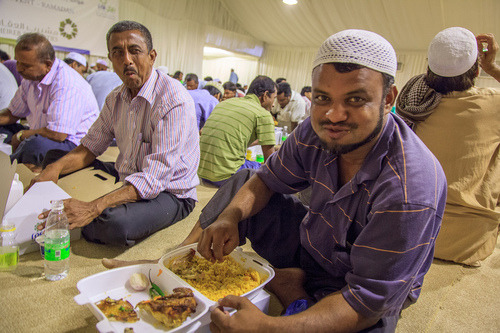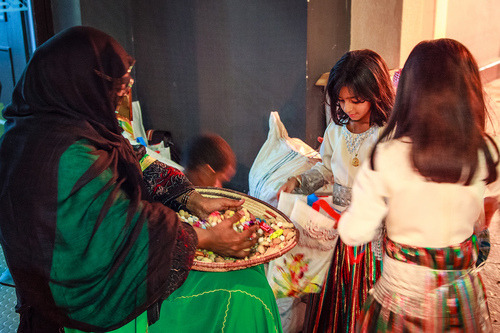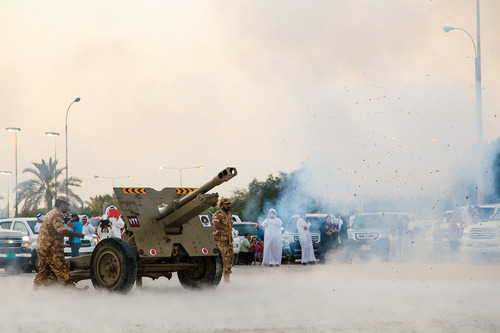
Ramadan is an annual event that predictably turns life in Doha upside down.
Because Qatar is a Muslim country, there are a few key things you should know about spending the holy month here.
1. Look for the moon. Ramadan always starts at night, with the first fast commencing the morning after. This year, that night will be either Monday, July 8 or Tuesday, July 9, depending on when the moon is spotted. Qatar will clarify which day fasting begins on Monday night.
The first day of fasting, thus, will be either Tuesday, July 9 or Wednesday, July 10. A full 29 or 30 days later, look for the moon again to determine when Eid al-Fitr holidays begin.
2. No eating (or drinking) in public. Fasting Muslims are required to refrain from eating, drinking, smoking and having sex from before dawn until sunset during Ramadan. Those who aren’t fasting, Muslim or not, will at least have to refrain from consuming food and drink publicly, as it is against Qatari law.
Most restaurants will be shut during daylight hours, but typically open up about a half hour before sunset. Also of note: Qatar more or less goes dry during Ramadan. Hotel bars stop selling liquor, as does QDC (the only store in the country licensed to sell alcohol for consumption at home).

3. Hours are shorter (and longer). One of the best and worst parts of Ramadan in Qatar is that work hours are shortened for most. According to the labor law, private companies are not allowed to make their employees work more than six hours a day, 30 hours a week (and if they do, must be compensated for overtime).
For all government-affiliated institutions, employees will be working five hours – from 9am to 2pm – although some agencies will also be keeping night hours.
Notably, shortened hours contribute to a decline in productivity in Qatar, leading to frustration with government services. This year, expect the situation to be even worse due to the 50C weather and long days (fasting will begin around 3:15am and end at about 6:30pm – meaning a little more than 15 hours without caffeine, nicotine, chocolate, sugar, and all sorts of other daily coping mechanisms).
4. Be wary at night. Due to the long fast and shorter work hours, many Qatar residents will nap during the afternoon and go out later than usual. As a result, expect traffic jams well into the night at any popular area with food options.
Also, just before sunset, when it’s almost time to eat – look out! People tend to drive a bit crazily when trying to get home, or to a restaurant, to break their fast.

5. Eating is the thing to do. Because fasting is supposed to encourage spiritual renewal, people tend to spend less time going to the movies (there are no new releases until Eid anyway) and more time with family and at the masjid.
But a lot of residents also spend the month taking advantage of Qatar’s many five-star restaurants, which put on lavish buffets for both iftar (at sunset) and suhoor (late night/early morning). Grocery stores also tend to cash in during this month because people are cooking and hosting parties more often.
6. But be careful not to overeat. Qatar hospitals regularly report seeing an increase in patients suffering from stomach ailments due to overeating in Ramadan. In the weeks leading up to this month, doctors have been advising residents to take care when breaking their fast and urge moderation in the consumption of all foods. Fried food and heavy meals are especially discouraged.
7. There are lots of cultural events. There are some cool ways to enjoy Ramadan in Qatar, especially if you have kids. For example, every day at sunset, Qatar follows a Middle Eastern tradition of setting off a canon to announce that it’s time to break the fast.
In Doha, security forces set up in the afternoon at the empty lot beside the General Post Office. Residents crowd around on foot or in their cars to get a glimpse of the action. Show up by 6pm if you want to get a good spot.

Celebrated in the middle of the month (usually the 14th or 15th), Garangao is a Ramadan celebration unique to the Gulf. Children wear traditional clothes and knock on neighbors’ doors to receive sweet treats, whilst singing a special song. You can expect some planned activities around this as well.
The Museum of Islamic Art will be keeping special hours for the month (it’s worth noting too at the MIA park will be closed until the second day of Eid), while at Qatar Foundation, Al-Shaqab will be hosting “Ramadan Horse Camps” for kids between 5 and 12 years old.
8. Remember the spirit of Ramadan. One of the main reason Muslims fast during this month is for spiritual reflection, and in Qatar there will be an opportunity to pray in congregation. Mosques across the country will be packed on Fridays and will be holding night “taraweeh” prayers daily. Towards the end of the month, many mosques will even host prayers late into the night and early into the morning.
Every Ramadan, all the major charities also sponsor iftar dinners around town that are particularly meant to benefit low-income workers.
And for non-Muslims – why not try fasting? Hyatt Plaza has an annual Fast-a-Thon scheduled for July 12 and 13 this year. The basic premise is that for every non-Muslim who registers to fast, QR200 is donated to Syrian refugees.
In past years, residents of all faiths have given us a breadth of reactions to and experiences of Ramadan in Qatar.
source: dohanews
Leave a Reply
You must be logged in to post a comment.